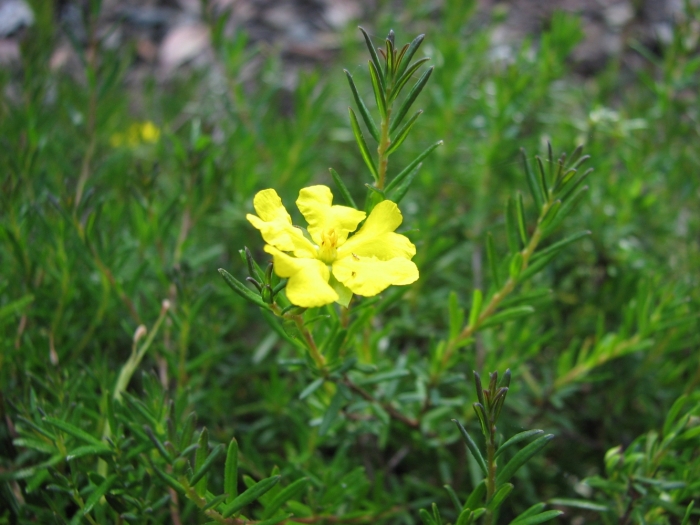Stalked Guinea-Flower
(Hibbertia pedunculata)
Stalked Guinea-Flower (Hibbertia pedunculata)
/
/

Melburnian
CC BY 3.0
Image By:
Melburnian
Recorded By:
Copyright:
CC BY 3.0
Copyright Notice:
Photo by: Melburnian | License Type: CC BY 3.0 | License URL: https://creativecommons.org/licenses/by/3.0 | Uploader: Melburnian | Publisher: Wikimedia Commons | Title: Hibbertia_pedunculata.jpg | Notes: Photo of ''[[Hibiscus denudatus]]'' (pale face) in [[Palm Canyon]], California, taken March 2005 by [[User:Stan Shebs]] {{GFDL-self}} |











Estimated Native Range
Summary
Hibbertia pedunculata, commonly known as Stalked Guinea-flower, is a perennial herb native to sandy and rocky heathland, as well as open sclerophyll forests in New South Wales, Australia. It is a prostrate or erect shrub that typically grows to a height of 20–60 cm (7.9–23.6 in) and is notable for its bright yellow, five-petaled flowers that bloom from late winter to early summer. The flowers are moderately showy and attract a variety of pollinators. This species is adaptable to a range of garden situations and is valued for its vibrant flowers and low-maintenance nature.
Stalked Guinea-flower is often used in rockeries, native plant gardens, and as a ground cover due to its sprawling habit. It is also suitable for coastal gardens as it tolerates salt spray. In cultivation, it thrives in full sun to part shade and requires well-drained soils, preferably sandy or loamy. While it can withstand low water conditions, moderate watering is beneficial during prolonged dry periods. Propagation is commonly achieved through cuttings or layering, and the plant is known for its ease of growth. Gardeners should be aware that it can be sensitive to phosphorus and may require low-phosphorus fertilizers.CC BY-SA 4.0
Stalked Guinea-flower is often used in rockeries, native plant gardens, and as a ground cover due to its sprawling habit. It is also suitable for coastal gardens as it tolerates salt spray. In cultivation, it thrives in full sun to part shade and requires well-drained soils, preferably sandy or loamy. While it can withstand low water conditions, moderate watering is beneficial during prolonged dry periods. Propagation is commonly achieved through cuttings or layering, and the plant is known for its ease of growth. Gardeners should be aware that it can be sensitive to phosphorus and may require low-phosphorus fertilizers.CC BY-SA 4.0
Plant Description
- Plant Type: Shrub
- Height: 0.8-1.3 feet
- Width: 1-1.7 feet
- Growth Rate: Moderate
- Flower Color: Yellow
- Flowering Season: Spring, Summer, Fall
- Leaf Retention: Evergreen
Growth Requirements
- Sun: Full Sun, Part Shade
- Water: Low, Medium
- Drainage: Fast
Common Uses
Bee Garden, Butterfly Garden, Drought Tolerant, Groundcover, Low Maintenance, Rock Garden
Natural Habitat
Sandy and rocky heathland, as well as open sclerophyll forests in New South Wales
Other Names
Common Names:
Scientific Names: , Hibbertia pedunculata, Hibbertia corifolia, Hibbertia pedunculata var. corifolia,
GBIF Accepted Name: Hibbertia pedunculata R.Br. ex DC